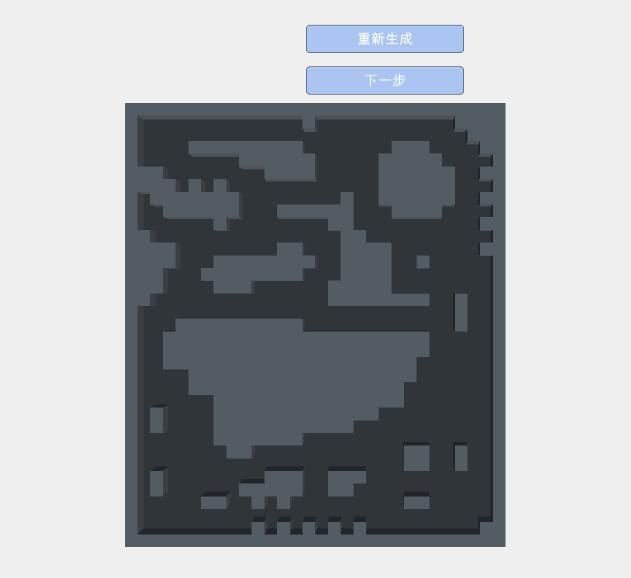用Unity实现《随机生成 Tile Based 地图之——洞穴》中的算法
https://indienova.com/indie-game-development/procedural-content-generation-tile-based-random-cave-map/ 原文地址
只做了初始的部分,改进后由于周围墙的检测大了一圈,数组里判定边界太麻烦,也没想到好的方法就懒得写了。
把代码绑在场景中任意物体上,并手动指定cube1和cube2即可, R键初始化,F键迭代,可修改行数和列数。
仅供大家参考。
2016.8.12重新编辑:
用二维数组重写了代码,算法也使用了改进后的,但生成的地图四周有些不太平整。由于原文写的比较精简,经过我对原文以及原网页JS代码的理解只能写到这样,供大家参考。
using UnityEngine;
using System.Collections;
public class Script : MonoBehaviour {
public int row = 30;
public int col = 35;
private bool[,] mapArray;
public GameObject cube1, cube2;
GameObject cubes;
int times;
int a;
void Start () {
cubes = new GameObject ();
mapArray = InitMapArray ();
CreateMap (mapArray);
}
void Update()
{
if (Input.GetKeyDown (KeyCode.R))
{
Button1 ();
}
if (Input.GetKeyDown (KeyCode.F))
{
Button2 ();
}
}
bool[,] InitMapArray()
{
bool[,] array = new bool[row , col];
for (int i = 0; i < row; i++)
{
for (int j = 0; j < col; j++)
{
array [i,j] = Random.Range (0, 100) < 60;
if (i == 0 || i == row - 1 || j == 0 || j == col - 1)
{
array[i, j] = false;
}
}
}
return array;
}
bool[,] SmoothMapArray(bool[,] array)
{
bool[,] newArray = new bool[row , col];
int count1, count2;
for (int i = 0; i < row; i++)
{
for (int j = 0; j < col; j++)
{
count1 = CheckNeighborWalls (array, i, j, 1);
count2 = CheckNeighborWalls (array, i, j, 2);
if (count1 >= 5 || count2 <= 2)
{
newArray [i, j] = false;
}
else
{
newArray [i, j] = true;
}
if (i == 0 || i == row - 1 || j == 0 || j == col - 1)
{
newArray [i, j] = false;
}
// newArray[i, j] = count1 >= 5 || count2 <= 2 ? true : false;
}
}
return newArray;
}
int CheckNeighborWalls(bool[,] array, int i, int j ,int t)
{
int count = 0;
for (int i2 = i - t; i2 < i + t + 1; i2++)
{
for (int j2 = j - t; j2 < j + t + 1; j2++)
{
if (i2 > 0 && i2 < row && j2 >= 0 && j2 < col)
{
if (!array[i2, j2])
{
count++;
}
}
}
}
if (!array[i, j])
count--;
return count;
}
void CreateMap(bool[,] array)
{
for (int i = 0; i < row; i++)
{
for (int j = 0; j < col; j++)
{
if (!array [i , j])
{
GameObject go = Instantiate (cube1, new Vector3 (i, 1, j), Quaternion.identity)as GameObject;
go.transform.SetParent (cubes.transform);
}
else
{
GameObject go = Instantiate (cube2, new Vector3 (i, 0, j), Quaternion.identity)as GameObject;
go.transform.SetParent (cubes.transform);
}
}
}
}
public void Button1()
{
times = 0;
Destroy (cubes);
cubes = new GameObject ();
mapArray = InitMapArray ();
CreateMap (mapArray);
}
public void Button2()
{
if (times < 7)
{
times++;
Destroy(cubes);
cubes = new GameObject();
mapArray = SmoothMapArray(mapArray);
CreateMap(mapArray);
}
}
}
